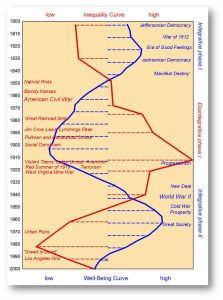Weekly Geopolitical Report – Modern Monetary Theory: Part III (March 25, 2019)
by Bill O’Grady
In Part II, we discussed the principles and consequences of Modern Monetary Theory (MMT). This week’s installment will be devoted to the importance of paradigms. Next week, we will conclude the series with a discussion on the potential flaws of MMT along with market ramifications.
The Importance of Paradigms
Every major shift in the efficiency/equality cycle has coincided with a favored economic theory to promote the change. The following chart from Peter Turchin shows his take on inequality and wellbeing cycles in U.S. history. Although Turchin doesn’t fit his pattern to Arthur Okun’s equality and efficiency tradeoff,[1] we see a strong match between this tradeoff and Turchin’s wellbeing and inequality cycles. During periods where Turchin’s wellbeing line is rising and inequality is falling, the economy is going through an equality cycle. Equality cycles are sometimes characterized by policies that favor labor (which may include high marginal tax rates, easy monetary policy, policies that favor unions and social mores that promote “the common man”[2]).
Usually, equality cycles end when the economy needs to build productive capacity to reduce inflation and thus needs to increase efficiency. These are policies that favor capital, which may include low or non-existent tax rates, reduced regulation, anti-organized labor policies and social mores that lionize wealth.[3]

[1] Okun, Arthur. (1975). Equality and Efficiency: The Big Tradeoff. Washington, D.C.: The Brookings Institution.
[2]https://en.wikipedia.org/wiki/You_Can%27t_Take_It_with_You_(film)
[3]https://www.youtube.com/watch?v=VVxYOQS6ggk
[4] http://peterturchin.com/cliodynamica/the-double-helix-of-inequality-and-well-being/


